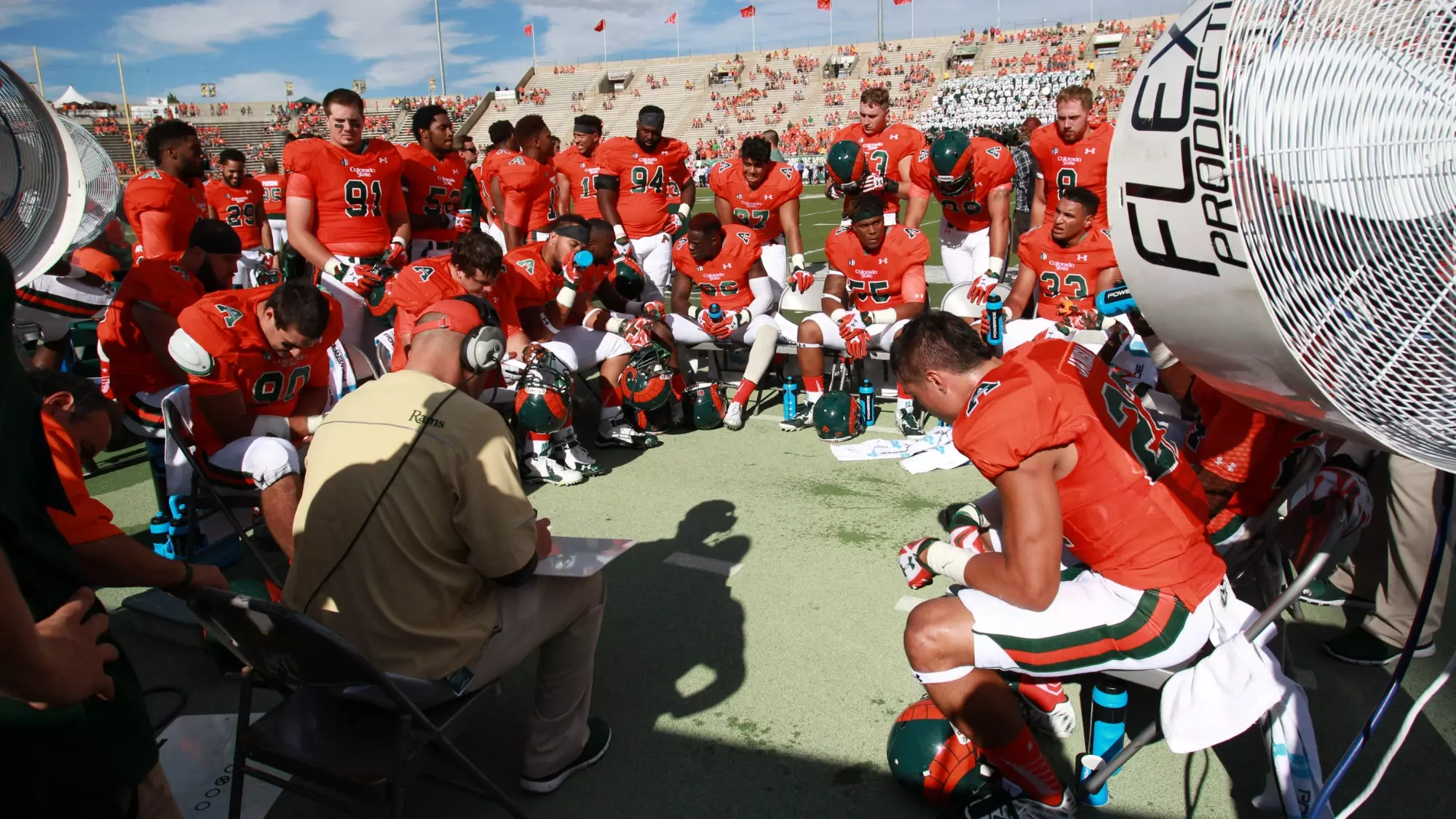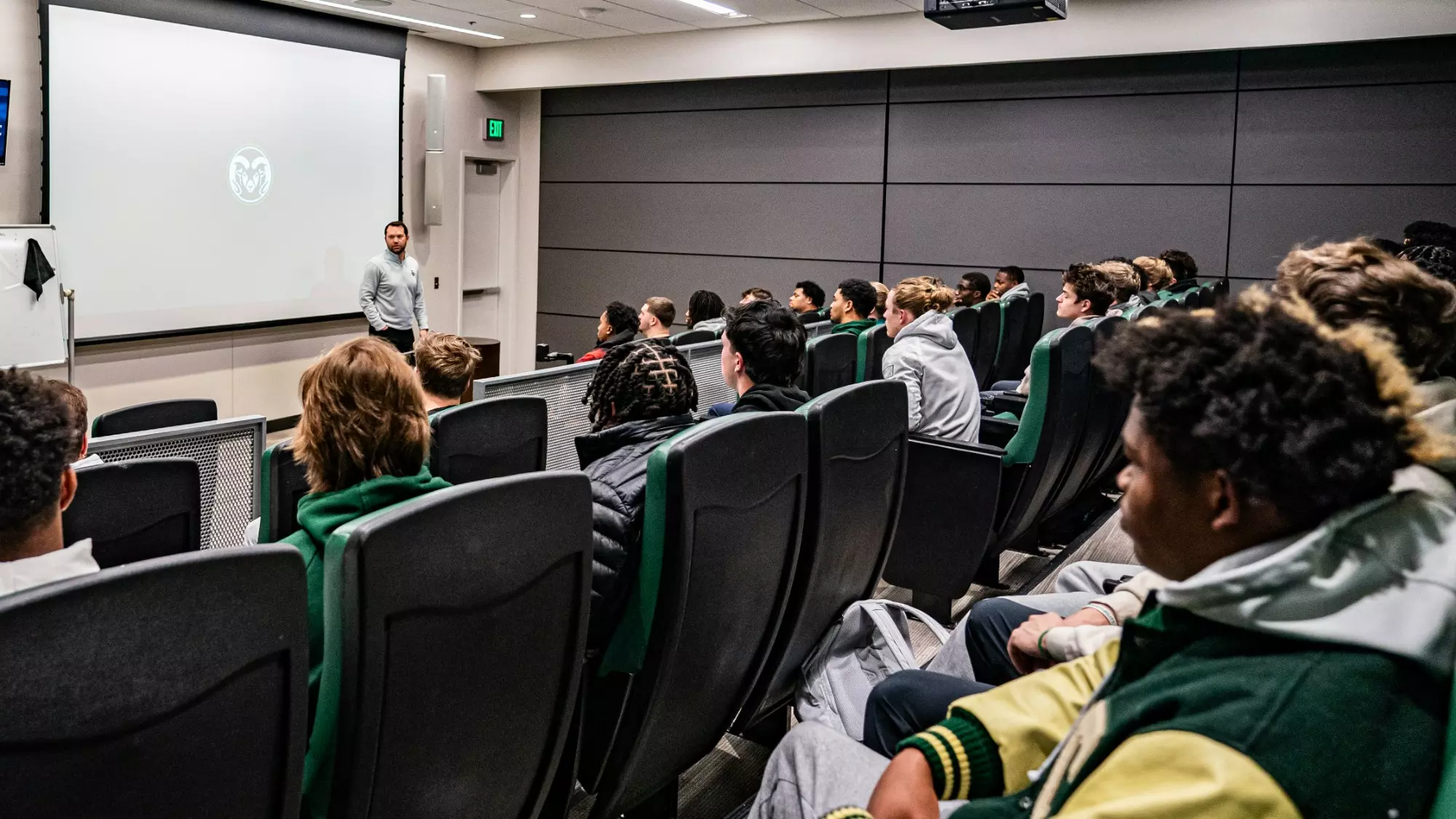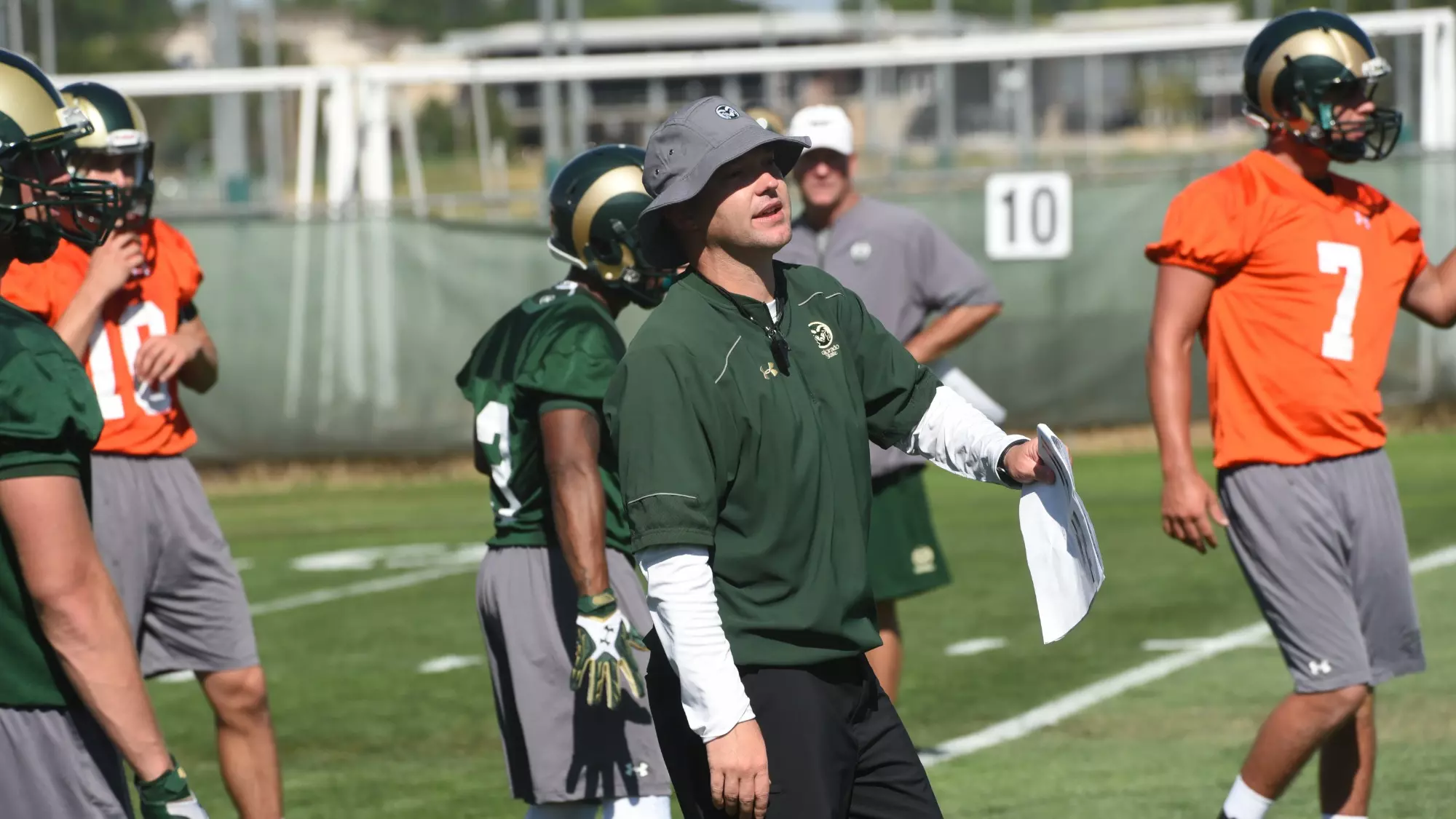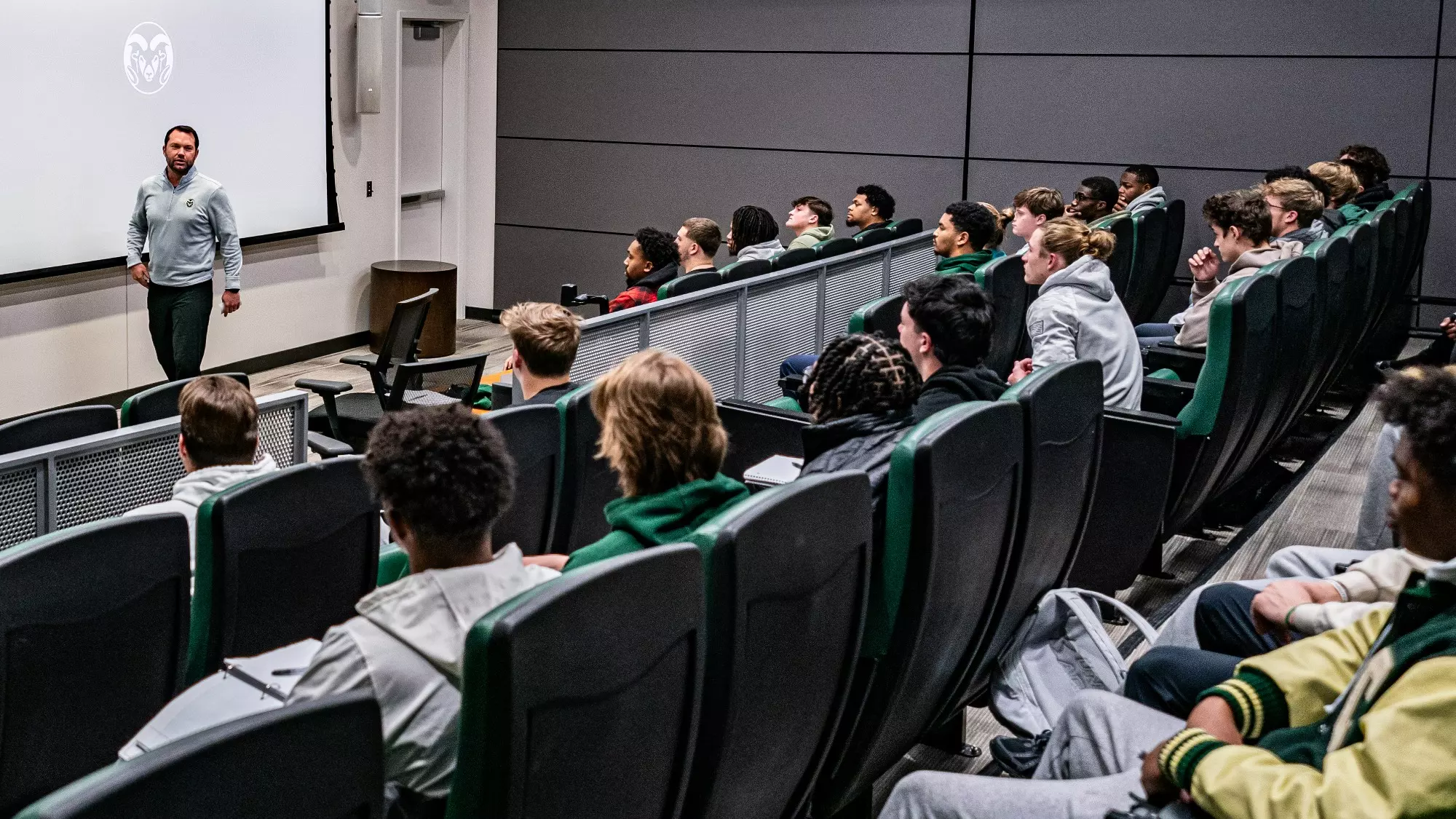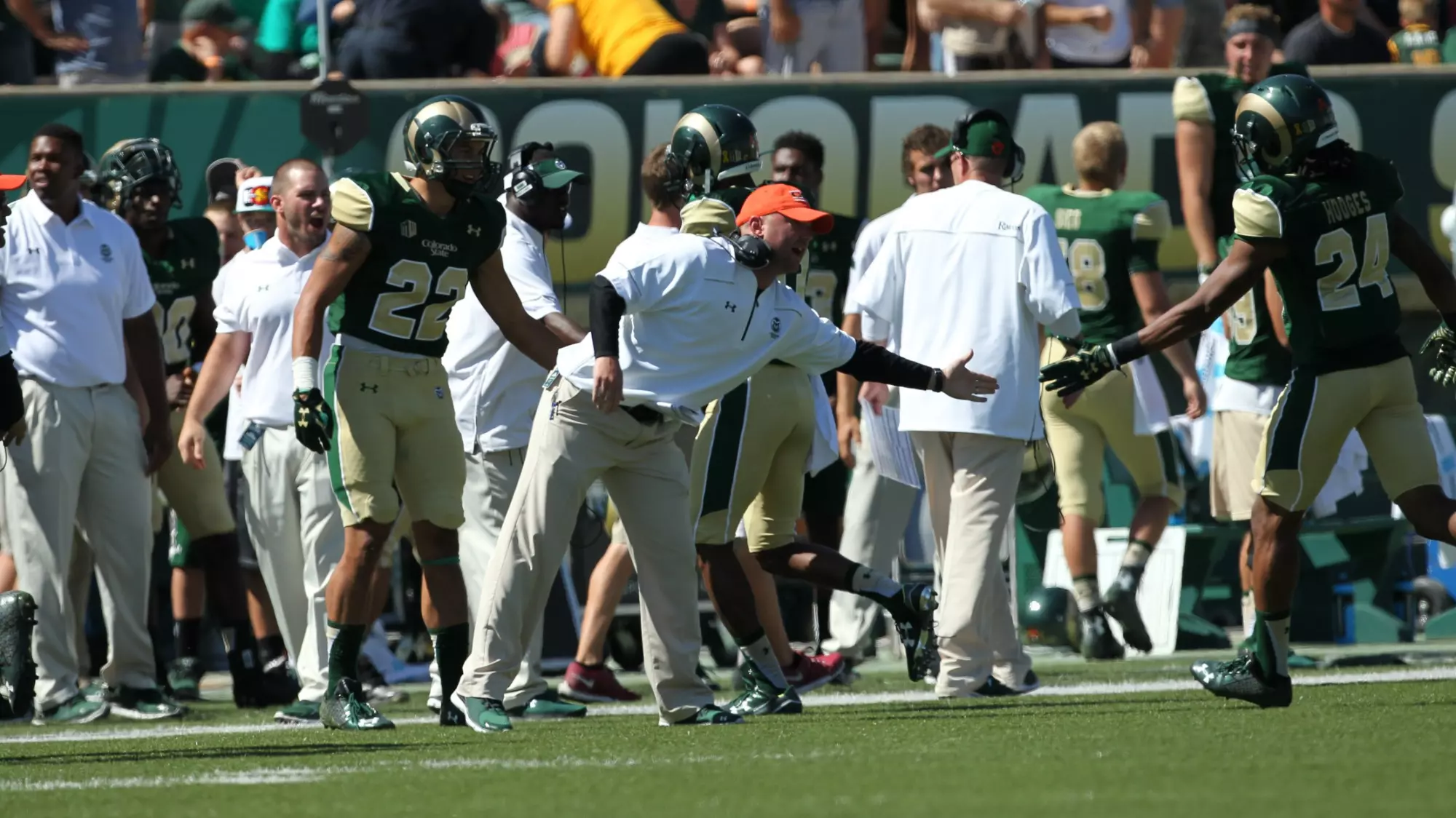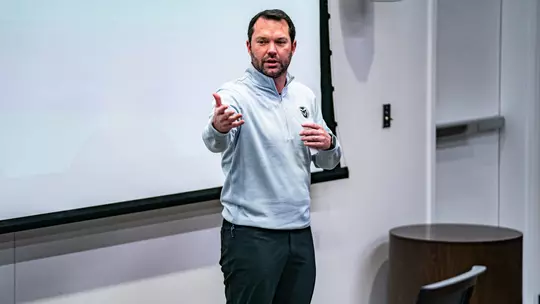
Back Again, But Not the Same
Summers’ return comes with added experiences
Mike Brohard
The pages on the calendar are flipped. It’s not just time which changes.
People too. There are highs and lows. Thinking will change. Habits too.
Experiences teach us what to keep, what to discard, what to blend. Where to set up an office. What car to buy. Never rule anything out.
“I would say yes other than it seems to keep finding me,” Tyson Summers said about his third trip to Colorado, his second stint at Colorado State as the Rams’ defensive coordinator. “Beth and I have laughed a bunch of times. When we first got here 10 years ago, we had to go buy a vehicle which had four-wheel drive. We go to Georgia Southern, and we sold it. We literally said what’s the likelihood we’re back in Colorado? Four years later, we’re back in Colorado and we need a four-wheel drive.
“Since then, the running joke has been we’ll be back in Colorado, so let’s get the four-wheel drive. It’s funny how it calls you.”
At the time, there wasn’t anything funny about receiving a call from the area code. Summers simply felt he was a resource for Jay Norvell to talk about other people.
It was not the call he expected.
Norvell had already made those calls. He wasn’t seeking a scheme, but a thought process. He wanted disruption to be the calling card of the defensive side of the ball, not locked into any one way of accomplishing the task. How to make a quarterback uncomfortable. How to get receivers offline. How to get an offensive line playing on its heels, not the toes.
How to adjust when the offense does.
“Within those discussions, Tyson’s name came up. I talked to several people over a couple of weeks, and then when I talked to Tyson, I felt really comfortable about the things he was talking about schematically,” Norvell said. “Bottom line, you have to disrupt people with players. You also have to disrupt with scheme, and Tyson has a lot of experience as a coordinator at several schools, he’s been a head coach … He’s been in a leadership role.”
The name is the same, the man is not. When his friend Mike Bobo hired him in 2015 to come to CSU, Summers had a shaved head and ground was breaking on Canvas Stadium. Summers was already more than a decade into his coaching career, but still in his infancy as a coordinator. He held the role the three years prior at Central Florida, and his concepts of defense were still developing.
He’d had influences up to that point. More were to follow. He’s seen how Kirby Smart does things. He’s had conversations with George O’Leary, Todd Grantham and Paul Pasqualoni.
He also watched the trends in the game change, rules favor the offense. He started to see some old-school doctrines were out the window, but some were still very much part of the modern game. The Air Raid played a crucial role. In fact, he studied Norvell’s Nevada offenses as part of his research.
You can try to label his defense, but it’s not a set scheme. You’ll see a bit of everything really, which is the norm for units which excel. Adapt and overcome. Not just the opponent’s personnel, but your own.
“I would say ours is more of a style of play than a system. I’m not a square-peg-in-a-round-hole guy,” Summers said. “I am, what players do we have, how do we utilize them the best? Even at Western Kentucky, there were years where we ran these two or three defenses base, but the next year we didn’t run them hardly at all because they didn’t fit the personnel we had. We were a portal team, so we were a whole new two-deep to some degree.”
Everything was changing, so the obvious deduction was he had to, as well.
From year to year. Within a year. What worked the first four games may not the next set of four when injuries occur. The last four games will be a mystery, too.
In a game, from series to series. Offenses like to establish strengths. Take those away, they have to move on to something else. Find what that is and be prepared. The base set which worked the opening three series’ of the game may have to be put in the back pocket. At the end of a game, in a 4- or 2-minute scenario, prepare for helter-skelter.
You understand it. You hire an offensive line coach to your defensive staff. And a quarterback’s coach. You create multiple plans to combat the assortment of formations and personal groupings you see, then limit what you work on based on what you’ll actually need for the upcoming game.
The next game may be different. The next series may be different. Be prepared. Have answers. Understand you can’t take away everything, but you can darn sure eliminate prime intent.
“I ended up with a different kind of denominator. We started calling them nine knockouts, meaning how can you end a drive,” Summers said. “If you play 12-13 series a game, which is what we were doing, you wanted to have nine series, any combination of three-and-out, four-down stop, kick a field goal or a takeaway. In that study, doing it five or six years ago, you could get to the same number. All those years it kept showing up that if we got our nine knockouts, we won the game at a 94-percent rate. Nothing other than winning or losing. Hit these nine knockouts, that meant winning the game. If you didn’t get them, it was hard to win the game.
“You can’t build a defensive call sheet that doesn’t allow you to do those things, so it’s all about creating havoc. You better have a different thought process, and you better have more things.”
Which will all be deciphered piece by piece in the defensive staff room. Or, as it will be better known from here on out, Summers’ office.
That’s where he set up. With all the white boards at his disposal to draw up and talk through concepts. Immediate access to film, though he still prefers pen and paper, a load of notebooks at his disposal. In the time it takes a graduate assistant to call up a clip, he can find the blueprint written out in hand.
“This is where I always am. For probably the past seven or eight years where I went, that’s part of it,”
Summers said. “I had offices at other places, but ultimately, I never walked in there. As college football changes and staffs change, it just became more convenient for me to come in here and let somebody have a nice office they could use. And when people came looking for me, they could find me. I don’t like a messy room, so if nobody is in charge of the staff room, it becomes messy; they’re worried about cleaning their office. If the staff room is my office, then I can keep all things in one place and keep it clean.”
He will hold staff meetings there with the coaches. He will also hold staff meetings in the team room, those involving the players. That’s where all they have will be whittled down and explained, detail by detail.
Over by his stack of notebooks is a stack of studies. Some by him, some by others. When offenses are successful, when they are not. When turnovers are most often created, when they are not. When it makes the most sense to bring pressure, when a defense is best served to sit back.
He understands all which he carries in his head. He wants his players to see it, too.
“What you’re trying to do is compartmentalize. When you start to say something is too much, how do you compartmentalize techniques and thoughts,” he said. “My Thursday unit meeting is called the staff meeting, and the staff is the players. I go through why I’m calling this, when I’m calling it, what I think about this call, here is the strength, here is the weakness. I go through the entire call sheet and situations so they can understand and compartmentalize.
“I think it will be huge what we’re best at. Again, I’m not a square peg, round hole; if I can’t play a defense, we’ll figure out something.”
This way of thinking was exactly what Norvell sought. Unconventional with a track record of success. Rigid on principal, flexible on approach.
He was sold. And the call where he was about to offer Summers the job, the candidate gave him a list of names, people who know how he thinks, people who don’t necessarily agree with him.
Who does that? A guy who understands he’s not for everyone. A guy who understands a strong working relationship is just as valuable to the overall success as the Xx and Os, the Jimmy’s and the Joe’s.
Norvell laughed.
“Yeah, I talked to them. I talked to everybody I felt would give me some insight on him,” Norvell said. “Let’s just be honest. As mature professionals who have had a long working life, we’ve all made mistakes. I thought Tyson was straight forward with some of the mistakes he’s made. He took responsibility for them and accountability. We’re not defined by our mistakes in the past. It’s how you react to them.
“I think he fits my personality as a coach. I’m a coach who has been around a while, been a part of a lot of different styles and different trends. I’m not married to one style of play, whether it’s offense or defense or special teams. I’ve been around long enough to understand you have to solve problems. Often that comes from experience, and Tyson understands that. He’s been around coaches who understand that. It’s not a personal thing; it’s a team thing. It’s solving a problem for the team. That’s the most important thing. I want to be aggressive. I am by nature. I’m that way offensively. I also played defense, and I have strong feelings about how our defenses will play.”
Summers has been coaching since 2002 at one level or another. His willingness to step outside the conventional ways of thinking are not always embraced, and that’s fine. Once they could both agree Summers was different and that was OK, they were set.
Outside the box was what Norvell wanted. Summers wants his defenses to operate under intelligent aggression. Aggressive, but not to a fault. Aggressive with purpose.
Not 11 starters, but up to 22. Or more. Every coach loves a player so good you can’t take him out of a game, but then again, Summers isn’t looking for players to be on the field all 80 snaps. He wants players who are fresh. He also wants players with a particular set of skills who, despite maybe taking only 20 snaps one week and possibly just 10 the next, are so good at what they do, they look like stars.
If a player can do something, Summers will find it. And he’ll use it. He’s found it makes for a happier locker room, a more connected group, when multiple people hold a key role. He wants them all to know the plan, when it will be used and how they fit the puzzle.
To be ready. Something is coming just around the corner. You may not see it, but you’ll be prepared.
Such as what to drive. When Beth and their two youngest sons move out later in the year, it will be in a four-wheel drive.
Support Colorado State Athletics: Tickets | Ram Club | Green And Gold Guard

